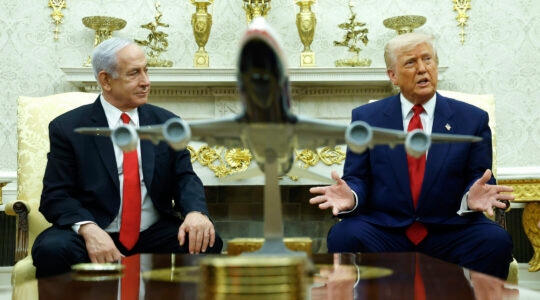JERUSALEM (JTA) – Seventeen months after the last shots were fired in the 2006 summer war between Israel and Hezbollah, Israeli Prime Minister Ehud Olmert’s political future again is under a cloud due to his poor performance in the war.
The growing pressure on Olmert to resign is expected to peak when the Winograd Commission he set up to investigate the Second Lebanon War publishes its final report on Jan. 30.
Although the report won’t call directly for Olmert to resign, it is expected to contain a damning indictment of his wartime decision-making.
The reserve soldiers and bereaved parents leading the public campaign against him are particularly incensed at Olmert’s decision to launch a large-scale ground operation when the war was virtually over and a cease-fire was scheduled to come into effect.
They say soldiers died in an operation Olmert knew would have little effect on the war’s final outcome and which he launched only to improve his image. Israel suffered its worse single-day casualty figure during that period, with 24 soldiers killed, including the son of Israeli novelist David Grossman.
Olmert has said he has no intention of resigning no matter what the report says. To do so, he argues, would be tantamount to desertion.
The prime minister, who leads the centrist Kadima party, survived the Winograd Commission’s strongly critical interim report last April that most pundits and many politicians thought would bring him down.
This time, however, the domestic political situation is different.
Labor leader Ehud Barak is under strong public pressure to honor a promise made last May to quit the Kadima-led government if Olmert refuses to resign after the final Winograd report is published. Labor’s leaving or threatening to leave could prompt new elections, a new Kadima leader taking over as prime minister or Olmert forming a new government without Labor.
Barak may want to keep his post as defense minister to complete the rehabilitation of the Israel Defense Forces and to influence the Annapolis peace process with the Palestinians. But if the report is as scathing as most analysts expect, he will find it difficult not to make Olmert’s ouster a condition for Labor remaining in a Kadima-led coalition.
For now, Barak is keeping close to the vest.
“I will read the report and do what’s best for Israel,” he declared enigmatically during a meeting of the Labor Party’s Knesset faction on Monday.
Last month, in response to a Knesset report on the war that seemed to put most of the blame on the army, Barak declared that the “political echelon was responsible for getting into the war, its conduct and its conclusion.” But that was more a defense of the military, which he now heads as defense minister, than a statement of intent regarding Olmert.
Most of the public pressure on Olmert has come from reservists who fought in the war and bereaved parents. The reservists’ campaign is being coordinated by Uzi Dayan, a former deputy chief of staff and leader of the small centrist Tafnit party.
Ironically they are targeting Barak, who was not a member of the wartime government. Labor Knesset members claim Dayan is working with opposition Likud leader Benjamin Netanyahu to embarrass Barak into bringing down Olmert and paving the way for early elections that polls say Netanyahu could win.
A group of reservists and bereaved parents forced their way into Labor’s Knesset faction meeting Monday, calling on Barak to act. He replied that reservists who had not read the as-yet-unpublished Winograd report shouldn’t be telling the nation’s leaders what to do about it.
“When the time comes, I will know what to do,” Barak declared.
The defense minister has several options. He could stay on with Olmert while agreeing with the opposition on new elections, perhaps in November.
That would enable Barak to carry out his plans for the army, promote the Annapolis process and give him time to re-establish his prime ministerial credentials from a high-profile position in government. And by helping spark elections, he could argue that he had kept his promise to oust Olmert.
But a possibly more appealing alternative would have Barak joining forces with Foreign Minister Tzipi Livni to oust Olmert immediately and set up a new government under Livni that could remain in office until the next scheduled election, in 2010. That would give Barak two more years to make his mark.
Livni is biding her time, but says when the report is released “all options will be open.” She will be careful not to make the same mistake she did after the preliminary report: calling on Olmert to resign before she had mobilized enough support in Kadima to force him to go.
Some Labor legislators contend that if Livni becomes Kadima’s leader, there will be a real chance for the formation of a Kadima-Labor alliance before the next elections to block the ascendancy of Netanyahu.
Netanyahu, sensing Olmert’s weakness, has been working to bring him down by detaching the right-wing Yisrael Beiteinu and Shas parties from the coalition. His wealthy patron, Sheldon Adelson, the American casino and real estate tycoon, has had meetings with Yisrael Beiteinu and Shas leaders, telling them that the Annapolis process is endangering Jerusalem and urging them to leave the government forthwith.
Yisrael Beiteinu already may be on the way out. Party leader Avigdor Lieberman says he will pull out of the coalition as soon as core issues like borders, refugees and Jerusalem are put on the negotiating table with the Palestinians.
For his part Olmert, one of the most skillful operators in Israeli politics, has been taking steps to keep his coalition intact.
Most significantly, he has resuscitated the defunct Religious Affairs Ministry to keep the fervently Orthodox Shas in the fold. He has also put out coalition feelers to opposition parties, including the dovish Meretz and the fervently Orthodox Torah Judaism.
As the pressure mounts, pundits are asking whether Olmert, the Houdini of Israeli politics, can escape again.
Will he be able to hold onto power by exploiting Labor’s dislike of Netanyahu, Knesset legislators’ reticence to shorten their own terms of office and Kadima’s lack of a clear mechanism to replace him?
Other than those tricks, Olmert has a rabbit in the hat: strong support from the Bush administration.
In interviews with the Israeli media ahead of his visit to Jerusalem this week, U.S. President Bush said he regarded Olmert as a “strong leader” and as a man “with a vision” – clearly someone he feels he can work with on the challenges faced by the United States and Israel in a volatile Middle East.
JTA has documented Jewish history in real-time for over a century. Keep our journalism strong by joining us in supporting independent, award-winning reporting.





